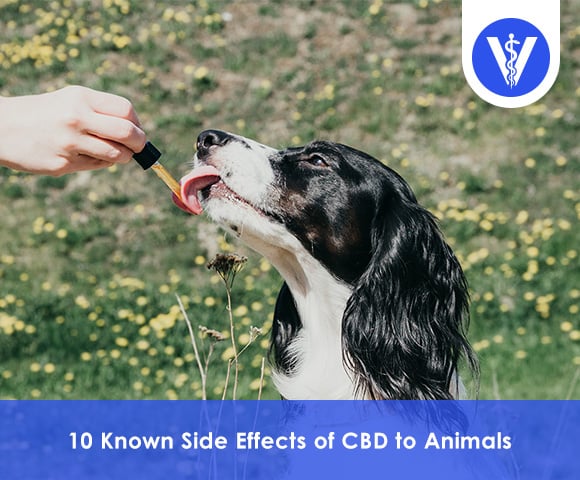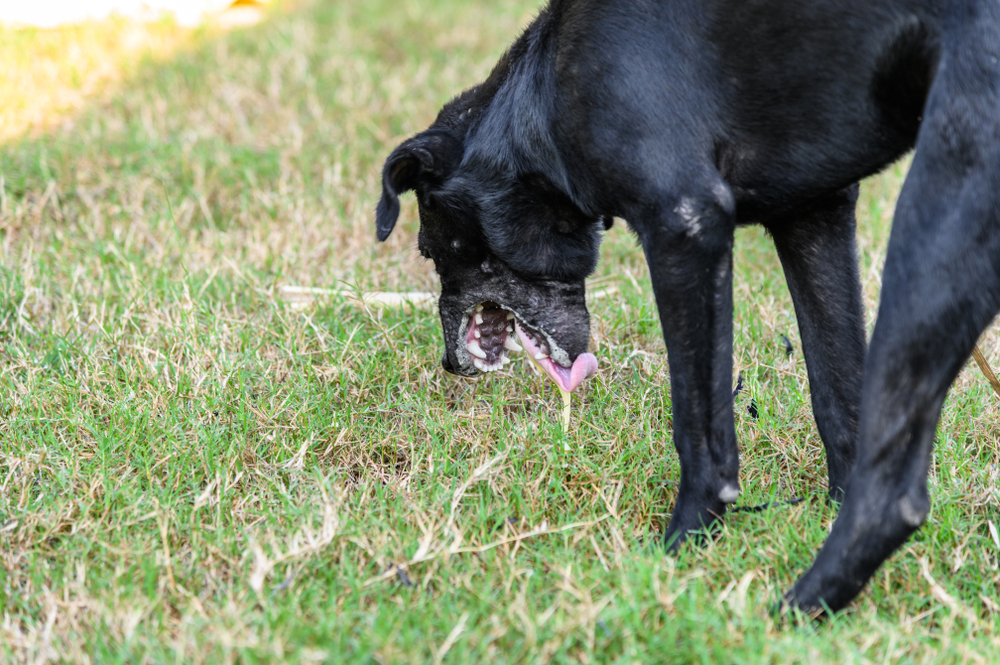10 Known Side Effects of CBD to Animals

Table of Contents
Animal CBD is a hemp-derived phytocannabinoid with beneficial, health-boosting features. CBD for animals works through the endocannabinoid system to promote health and balance.
CBD has many health benefits for animals, from reduced pain and inflammation to improved mood and immunity. CBD has side effects in some pets, but they are benign.
Pet owners interested in cannabinoids have questions, such as “Can CBD make my dog more anxious,” “Can CBD cause diarrhea in dogs,” or “Does hemp make dogs more tired?” Which of these adverse effects of CBD for dogs are true is discussed below.
1. Lethargy
Lethargy is one of the most commonly reported pet CBD side effects. It manifests with decreased energy, sleepiness, and disinterest in everyday activities.
Lethargy is almost always the result of high CBD doses. Lower the pet’s CBD dose if the hemp makes your dog more tired, and see if usual energy and interest levels resume.
2. Dizziness
Another possible pet CBD side effect is dizziness. It is described as feeling unsteady or faint and manifests with difficulty standing up, repeated falling, trouble keeping balance, etc.
Dizziness is usually caused by impure, low-quality pet CBD products that contain trace amounts of THC (more than the allowed 0.3%). THC is toxic to animals and lethal.
Always buy THC-free pet CBD products from reliable brands to avoid unwanted complications. Read the COA (Certificate of Analysis) to confirm the amount of THC in the pet product.
3. Dry Mouth
CBD for pets reduces saliva production, thus causing dry mouth (similarly, people using cannabis describe a so-called “cottonmouth” sensation).
The medical term for dry mouth is xerostomia. A dry mouth hurts, causes halitosis or bad breath, and makes swallowing difficult. Xerostomia increases the possibility of dental problems if it is persistent.
Ensure the pet has access to fresh drinking water to avoid dry mouth and reduce the CBD dosage until the side effects or symptoms disappear.
A dry mouth resulting from CDB use in animals is temporary and resolves with the correct dose.
4. Vomiting
Vomiting occurs due to stomach irritation. Vomiting as a side effect of CBD in pets results from several factors, including the CBD taste and carrier oil.
Cannabinoids trigger vomiting. New supplements always have the potential to cause vomiting in pets. CBD has a naturally bitter taste that most pets find repulsive.

CBD products use carrier oils to distribute the CBD, and the carrier oils cause vomiting in animals. Carriers are edible oils, which are usually coconut oil or hemp seed oil.
Use pet-friendly flavored CBD products that mask the naturally harsh taste of CBD to prevent vomiting. Use a different product with another carrier if the vomiting persists.
5. Diarrhea
Stomach irritation manifests with diarrhea: Loose stool or frequent defecation. All new foods and supplements result in diarrhea episodes, especially in pets with sensitive stomachs. CBD is able to cause diarrhea in dogs or cats when they begin CBD treatment.
Diarrhea, in the context of CBD supplementation, stems from the carrier oil or the overall high-fat content in CBD products for animals.
Diarrhea is usually a side effect until the pet gets used to the CBD product. Lower the CBD dosage or try a new product with a different carrier oil if diarrhea persists.
6. Upset Stomach
Vomiting and diarrhea are symptoms of an upset stomach. New foods, drugs, and supplements often agitate pets’ sensitive stomachs.
The best way to avoid stomach upset is to introduce pet CBD slowly. Start with a small dose and gradually increase the CBD to the recommended dosage to avoid side effects.
7. Stop Production of Liver Enzymes
Pet CBD affects liver enzyme production. Liver enzymes metabolize medication. Scientific data on the topic is conflicting; some studies show increased alkaline phosphatase (ALP), while others demonstrate inhibited cytochrome P450 (CYP450) enzymes.
The animal is unable to correctly metabolize other drugs when the liver enzymes responsible for medication breakdown are inhibited. The drugs become more potent, which increases the risk of overdoses.
Talk to a veterinarian before administering animal CBD to prevent the side effect, and ensure the veterinarian is aware of all medications and supplements the animal is taking.
8. Increased Tremors
CBD for animals results in increased tremors, but it is unusual. Tremors are defined as involuntary and rhythmic muscle contractions.
Increased tremors are a rare side effect of CBD. They are only described in humans (especially those with Parkinson’s disease). CBD adverse events are similar in all mammals, meaning tremors are possible in pets too.
Reduce the CBD dosage until the twitching disappears, and consult a veterinarian if the contractions persist.
9. Itchiness
Itchiness (scratching and biting) occurs if the animal is sensitive to some CBD product ingredients.
Itchiness is a relatively rare CBD side effect. Use pure and high-quality products to ensure the pet doesn’t itch.
Persisting itchiness, even when using quality CBD, is troublesome. Lower the amount of CBD; if there is no effect, it is best to discontinue the CBD use altogether.
10. Low Blood Pressure
Pet CBD triggers an episode of temporary hypotension: Decreased blood pressure. It manifests with light-headedness and dizziness, which are confusing and uncomfortable for pets.
The blood pressure drop is dose-dependent and associated with high CBD doses. Give the animal less CBD to minimize these side effects, particularly if they are not used to CBD products.
What is CBD?
CBD (cannabidiol) is a phytocannabinoid first isolated from the Cannabis sativa plant, which also contains hemp, marijuana, and ruderalis, in 1940.
The cannabis plant has 113 naturally occurring chemicals called cannabinoids, but CBD (cannabidiol) and THC (tetrahydrocannabinol) are the most important. CBD and THC are prevalent, accounting for 40% of the cannabis extract.
So, what is CBD? Simply put, it is a health-boosting hemp extract with rare and benign side effects on animals.
Are the side effects the same with dogs?
Yes, the side effects of CBD in dogs are the same. The most common adverse reaction in dogs is diarrhea.
Kelly Deabold and associates published a study titled “Single-Dose Pharmacokinetics and Preliminary Safety Assessment with Use of CBD-Rich Hemp Nutraceutical in Healthy Dogs and Cats” in 2019. Fifty-three adverse events occurred during the trial, and 44 were soft stool (diarrhea). The conclusion is that one of the most common CBD side effects to dogs is diarrhea.
Are the side effects the same with cats?
No, the side effects of CBD are not the same with cats. Cats show some unique side effects, while some adverse reactions overlap.
The most prevalent CBD side effects to cats, according to a 2023 research titled “Pharmacokinetics of escalating single-dose administration of cannabidiol to cats,” were head shaking, lip smacking, and hypersalivation.
How Does CBD Work for Animals?
CBD for animals works through the endocannabinoid system (ECS).
The ECS is a regulatory system present in almost all animals. It has three elements: Endocannabinoids (endogenous ligands), endocannabinoid receptors, and enzymes.
The ECS regulates vital body functions like metabolism, pain, inflammation, immunity, mood, memory, etc.
The answer is “boosts health, manage pain and anxiety, seizures and other ailments” when asking, “What CBD does for dogs.”

CBD works for animals by supporting the ECS to keep internal health functioning smoothly and promote wellness and balance. CBD for animals has benign and infrequent side effects.
CBD works for dogs by reducing pain associated with osteoarthritis. A Cornell Study showed 80% of dogs with osteoarthritis experienced a reduction in pain, giving the dogs an improved quality of life.
CBD products for dogs are able to reduce itching and chewing associated with atopy (a skin allergy). Dogs One Australian study showed that 65% of dogs with atopy experienced a 50% reduction in itching and chewing when given CBD over four weeks.
Is there a CBD Product Intended for Animals?
Yes, there are many animal CBD products. The modern pet market offers plenty of CBD products formulated specifically for animals. Animal CBDs include oils, treats, capsules, creams, patches, and powders.
Pet CBD products differ from human CBD products. CBD products for animals must be made from hemp, while human CBD comes from marijuana. CBD products for animals produce very few side side effects.
Hemp contains healthy cannabinoids, while marijuana contains healthy CBDs and psychoactive tetrahydrocannabinol (THC). THC makes people feel “high” and is toxic to animals.
Can Dogs Overdose on CBD?
No, dogs cannot overdose on high-quality hemp CBD products.
Giving a dose higher than the recommended standard is not harmful. CBD does not interact with brainstem receptors or areas responsible for breathing, thus making lethal overdoses practically impossible.
The worst-case scenario is that the dog experiences mild and temporary side effects. The most common adverse event is stomach upset (diarrhea).
Dog CBD calming treats include side effects like drowsiness and lethargy. The dog is likely to be sleepy and sleep more due to the extra CBD.
What are Studies About Applications of CBD for Animals?
Studies about pet CBD are relatively new but promising. Current information suggests that CBD for pets improves mobility in arthritic dogs. Animal CBD reduces seizure frequency.
Pet CBD is beneficial for unwanted behavioral problems such as aggression and noise phobias. Mice studies show it has panicolytic effects, promoting calmness in high-risk situations.
Allergic dogs benefit from CBD, too. CBD helps control itchiness and manages atopic dermatitis. It reduces intraocular pressure in cats with glaucoma.
What are the Benefits of CBD for Animals?
Listed below are the CBD benefits to animals.
- Pain Relief: Pet CBD lowers anandamide levels (the chemical responsible for pain). It reduces pain, especially episodes associated with neuropathic and osteoarthritic pain.
- Reduced Inflammation: CBD for animals has anti-inflammatory powers. It is rich in omega fatty acids, which help reduce inflammation.
- Seizure Control: Pet CBD has anticonvulsive properties and helps reduce seizure frequency. A groundbreaking dog study suggests it helps in as much as 89% of epilepsy cases.
- Anxiety Management: CBD for pets supports relaxation. It helps with behavioral problems such as noise phobias and aggression.
- Boosted Immunity: Animal CBD boosts immunity. It has powerful antioxidant properties, which additionally fortify the immune system.
- Improved Sleep: Human studies suggest that CBD promotes better and more restful sleep. It is safe to assume that the same benefit applies to pets since the CBD effects are similar among mammals.
- Better Appetite: CBD improves appetite and helps manage problems such as nausea and vomiting. Improved overall hunger is one of the most significant benefits of CBD to animals.
What are the Risks of CBD for Animals?
The principal risks of animal CBD are the potential for side effects, blood thinning properties, and low-quality and mislabeled CBD products on the pet market.
Listed below are the risks of CBD for animals.
- Side Effects: CBD causes side effects in animals, but they are rare, brief, and generally harmless. CBD side effects in pets include diarrhea, lethargy, dry mouth, etc.
- Increased Bleeding Risk: CBD increases the risk of bleeding and must be discontinued in pets undergoing surgeries.
- Low-Quality CBD: The pet CBD market is underregulated. A Leafreport analysis reports that up to 56% of pet CBD products are mislabelled.
- Allergies: Some pets are allergic or sensitive to cannabinoids or other ingredients in the CBD product.

Pet owners often ask, “What are the risks of CBD to animals?” The answer is there are certain risks associated with CBD use in animals, but they are easy to manage by using high-quality CBD products specifically formulated for pets. Ensure the animal CBD product contains less than 0.3% THC content, follow dosage guidelines, be aware of potential drug interactions, and monitor individual pet sensitivities. Pet owners are able to safely give their dogs CBD by following these steps and checking with a veterinarian.
What are the Things to Look at when Buying CBD for Your Pets?
Listed below are the things to look at when buying CBD for pets.
- Source: CBD for pets must be sourced from hemp and contain less than 0.3% THC (in which case it is labeled THC-free). The hemp is preferably organic and grown in the USA.
- Extract Type: Always buy full-spectrum hemp. Full-spectrum CBD has a rich profile of cannabinoids and additional compounds such as terpenes, flavonoids, and omegas that boost the CBD’s effects. Broad-spectrum extracts contain fewer cannabinoids and isolate only one specific cannabinoid.
- Certificate of Analysis: A third-party lab must test the animal CBD product and issue a Certificate of Analysis (COA). The test results appear in the COA.
- Quality Brand: Research the CBD brand before deciding. Reputable brands are transparent and do not make false claims regarding their CBD products. Reading reviews from other customers is helpful.
Is there a Right Dosage of CBD for Animals?
Yes, there is a right dosage of CBD for animals. The recommended CBD dose for animals is between 1 and 5 milligrams per 10 pounds or 4.53 kilograms of body weight. Pets respond differently to CBD and require adjustments to the dosage to find the appropriate amount for the pet.
Start with the smallest amount of CBD for the pet’s body weight. Increase the dose to achieve the desired effect, if necessary. Decrease the dosage even more if there are side effects.
Is CBD Oil Safe in Animals?
Yes, pet CBD oil is safe for animals. Pet CBD is made of hemp, meaning it is free from the psychoactive THC and does not make animals “high.”
CBD “appears safe to be used on pets,” according to The Anti-Cruelty Society. Colorado State University agrees and says, “CBD is a well-tolerated supplement.”
The Annual Review of Animal Biosciences published a paper in 2023 titled “Scientific Validation of Cannabidiol for Management of Dog and Cat Diseases.” The results demonstrated that pet CBD has a “good bioavailability and safety profile with few side effects” in dogs and cats.
CBD side effects are possible. The answer is “yes” when asking, “Is CBD safe for animals?” CBD oil has side effects, but they are rare, mild, and easy to deal with by changing the dose.
















